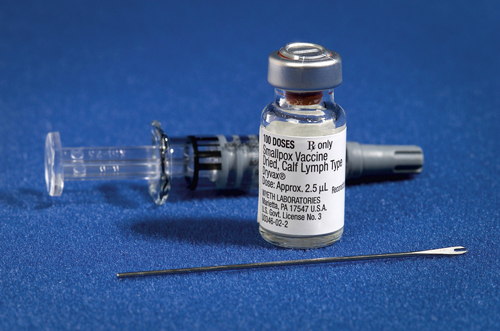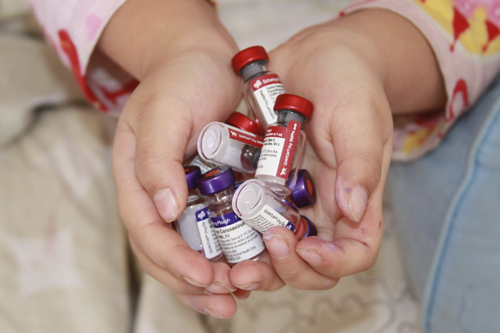Children have an in-built susceptibility to disease, as their immune system is still vulnerable. A major concern for parents, especially for those with young children, is to determine whether or not to vaccinate their kids. Like most medications, vaccines have a certain level of risk and vaccinating your child is a choice that a family has to make on their own. Here, we look at which shots you can expect to get when you give birth at a hospital in Beijing. We spoke to Dr. Jianhua Duan of New Century Women’s and Children’s Hospital (NCWCH), Dr. Guangqiu Wu, director of the Pediatrics Department at GlobalCare Women’s and Children’s Hospital, and Dr. Mary Jayne San Jose Ziermann, chief of the Pediatrics Department at Oasis International Hospital.
Under Chinese law, all babies, Chinese or otherwise, born in a Chinese hospital must be injected with the hepatitis B vaccine (HBV) and tuberculosis-TB (BCG) vaccine immediately after birth. In 1992, China began the Expanded Program on Immunization (EPI) that involves a mandatory 11-vaccine schedule given to children from 0 to 6 years. The vaccination schedule is compulsory for Chinese citizens but optional for expats.
According to Dr. Ziermann vaccination schedules are country specific because the selection of vaccines recommended depends on which diseases are common in each specific country. “If families intend to live in China for a considerable amount of time, for example over two years, then they need to consider vaccinations for diseases on the Chinese immunization schedule, which are more common here than in their home country,” says Dr. Ziermann. Dr. Duan says: “If you are staying [here]for more than three months, then it’s a good idea to get vaccinated against diseases such as TB, hepatitis A, B and Japanese B encephalitis which are more prevalent in China.”

China’s Schedule of Immunization Shots
The vaccination schedule is compulsory for Chinese citizens but optional for expats.
Compulsory Vaccinations:
Hepatitis B (HBV)
China has 130 million people infected with hepatitis B (representing a third of the worldwide rate), among which 30 million are chronic carriers. Hepatitis B is a liver disease that exists in a mild, acute form lasting a few weeks and a serious lifelong condition.
In China, the disease is most commonly transmitted through neonatal or early childhood infection. The disease can also be spread through exposure to body fluids such as blood, semen, and vaginal fluid.
“It’s now a must for any pregnant woman who visits a Chinese hospital to be tested for the virus between 8-12 weeks,” says Dr. Wu. This regulation was introduced after an increase of HBV infections. If the mother is a carrier, both she and her unborn child are given hepatitis B immune globulin (HBIG) at 36 weeks of pregnancy. After birth, the child is also given an accelerated course of the HBV vaccine. The dosage of the vaccine depends on the weight the baby.
Dr. Duan says, “If you’re planning on traveling in China, I would insist on getting vaccinated as the prevalence of the disease is higher in rural areas. The HBV vaccine is administered in three shots over the course of several months for both adults and children.
Japanese Encephalitis (JE)
JE, a mosquito-borne disease that causes inflammation of the brain covering, is endemic in China. There is no known cure for the disease but its symptoms, which include disorientation, high fever, coma, and tremors can be treated. If left untreated, JE can result in physical and mental disabilities. The disease is more likely to be contracted in rural areas. Dr. Wu recommends that all those who will travel to the rural parts of China or countries such as India should get this vaccination.
The shots are given to children when they are 8 months then boosters are administered when children are aged 1 and 2 years old. Vaccines for older people are given in two shots 28 days apart.
Hepatitis A (HAV)
Hepatitis A is transmitted when fecal matter enters the mouth, usually though food touched by unwashed hands. This disease is non-fatal but can lead to gradual liver failure. Symptoms such as fever and jaundice can last up to six months in some cases. Pregnant women are the most susceptible to this disease. Therefore, women who are expecting or planning to get pregnant while in Beijing are advised to get vaccinated. Dr. Wu says that HAV is not as routinely tested for as HNV but should not be ignored. “You can come into contact with infected surfaces at anytime, therefore it is better to get the vaccine for peace of mind,” she says.
The HAV vaccine is a series of two shots spaced six to 18 months apart for children.

Recommended Vaccinations:
Chickenpox
Chickenpox is a highly contagious and common disease caused by the varicella-zoster virus, a member of the herpes family. Chickenpox is transmitted when one comes in contact with an infected person. The most common symptoms are an itchy blister-like rash, fatigue, and fever. It can lead to severe skin infection, scars, pneumonia, brain damage, or even death if left untreated.
“[The vaccine] should be taken by those traveling a lot or who are mostly likely to come into contact with people where the disease is still prevalent,” says Dr. Wu. Some international schools require proof of this vaccination before a child is admitted, due to its contagious nature.
The vaccine is administered in two doses, the first at 12-15 months old and a second dose at 4-6 years old. If the child is exposed to chickenpox, the vaccine is given within three to five days. Children above 13 and adults who have never had chickenpox should get two doses at least 28 days apart.
Rotavirus
Rotavirus is the leading cause of severe acute gastroenteritis (vomiting and diarrhea) among children worldwide. The virus spreads easily through hand-to-mouth contact. If an infected person doesn’t wash their hands after using the toilet or changing a diaper, the disease spreads to anything they touch, including toys, food and utensils.
Rotavirus can also easily affect adults. The major symptoms are severe watery diarrhea, often with vomiting, fever, and abdominal pain, which can last three to eight days.
The vaccine is given in three doses when the child is 2 months, 3 months and 6 months of age. However, parents should note that it will not prevent vomiting and diarrhea caused by other viruses or pathogens.
Rabies
China has the second-highest number, after India, of reported rabies cases worldwide, according to the World Health Organization. In the West, most doctors do not routinely prescribe this vaccine or mention it to patients who are leaving for China. It can take up to one year for the symptoms to develop. In China, dogs are the most frequent rabies transmitters. If left untreated, the disease is invariably fatal.
Pre-exposure, the vaccine is given in three shots (seven days apart within a month). In the event of an attack by an animal suspected to have rabies, five shots series are administered after the bite as well as a course of rabies immunoglobulin. The latter is much more expensive than the former, so prevention is key here. At the time of writing only Beijing United Family Hospital has the imported rabies vaccine, while other hospitals administer the
Chinese rabies vaccine.
Where to Get Vaccinated
Only CCDC certified clinics and hospitals are allowed to administer all the mandated vaccinations in the table on p56. The only exceptions are the HBV and BCG, which are injected at birth, are available in all birthing hospitals.
The Vaccination Situation
In July 2014, the World Health Organization (WHO) renewed China’s National Regulatory Authority (CNRA) vaccines regulatory oversight standards qualification. The WHO first approved the qualification in March 2011. China’s Food and Drug Administration (CFDA) under the CNRA issues vaccine-manufacturing license to 34 companies that meet the Good Manufacturing Practices requirements. What does this mean? It translates to the WHO granting China approval to manufacture vaccines as it had met the international qualification standards. This in turn made it difficult to get your hands on imported vaccinations.
There are three types of vaccines available imported, local, and joint ventures. Those manufactured by joint ventures are the most common type and the imported are the most rare or hard to find.
Types of vaccination
Imported vaccines, Joint venture vaccines, Local vaccines
Disease
Pneumococcal disease, Hepatitis B, pentaxim (5 in 1 for diphtheria, tetanus, pertussis, polio and Hib), rabies , Japanese encephalitis, varicella, MMR, hepatitis A, DTaP, BCG
According to Dr. Duan and Dr. Ziermann, all of vaccines they use, whether imported, joint venture, or local, have to follow the regulations mandated by the WHO, such as using a cold chain system in transportation and storage to ensure the safety of the vaccine.
Resources
OASIS International Hospital 北京明德医院
Mon-Fri 9am-6pm, Sat 8.30am-12.30am, daily 24hr emergency care. 9 Jiuxianqiao Beilu, Chaoyang District, Chaoyang District (400 UR OASIS) www.oasishealth.cn 朝阳区酒仙桥北路9号
Beijing New Century Women’s and Children’s Hospital 北京北京新世纪妇儿医院
Daily 24hrs. 5/F, 51 WangjingBeilu (inside Wanghu Park South Gate), Chaoyang District (5178 3366) www.ncich.com.cn
朝阳区望京北路51号院望湖公园南门5层
GlobalCare Women’s and Children’s Hospital
北京五洲妇儿医院
24 Xi Dawang Lu (south of Shuangjing Carrefour), Chaoyang District. (400 8900 789, 6770 5558 for appointments)
www.globalcarecn.com朝阳区西大望路23号双井家乐福南
Center for Disease Control and Prevention (CDC)
www.cdc.gov
World Health Organization (WHO)
www.who.int
Beijing United Family Hospitals and Clinic
北京和睦家医院
www.beijing.ufh.com.cn/
Having a Baby in China
www.havingababyinchina.com
2014 Recommended Immunizations for Children from Birth Through 6 Years Old
Birth HepB 乙型肝炎疫苗, BCG 卡介苗
1 month HepB 乙型肝炎疫苗
2 month Oral Polio 脊灰疫苗 脊
3 month Oral Polio 脊灰疫苗 脊, DPT/DTaP 白百破疫苗
4 month Oral Polio 脊灰疫苗 脊, DPT/DTaP 白百破疫苗
5 month DPT/DTaP 白百破疫苗
6 month HepB 乙型肝炎疫苗, MCV Group A ( Meningococcal ) A群流脑疫苗 (second dose 3 months later)
8 month Measles,Mumps 麻风 (麻疹) 疫苗, Japanese B Encephalitis 乙脑疫苗
18 month Hepatitis A甲肝减毒 活病毒
19-24 month DPT/DTaP白百破疫苗, Measles, Mumps, Rubella麻风 (风疹, 麻疹) 疫苗
2-3 year MCV Group A & C ( Meningococcal ) A+C群流脑疫苗 3 year and 6 year
4-6 year Oral Polio 脊灰疫苗 脊, Diphtheria 白破疫苗 , MCV Group A & C ( Meningococcal ) A+C群流脑疫苗, 3 year and 6 year
This article originally appeared on page 54-57 of the beijingkids September 2015 issue. Click here to read the issue for free on Issuu.com. To find out how you can get your own copy, email distribution@truerun.com.




